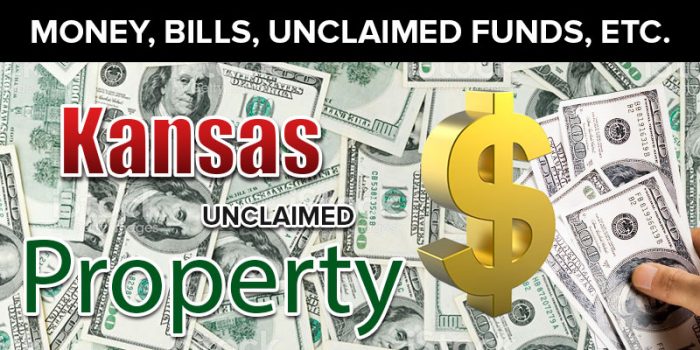
Contents
In Kansas, the unclaimed property program is handled by the Kansas State Treasurer. The current Kansas State Treasurer is Jake LaTurner, who was sworn in in April 2017. He has been responsible for expanding outreach efforts for the state’s unclaimed property program, which he has done by using both social media and constituent outreach programs to reach more people.
In Kansas, unclaimed property refers to property that has been abandoned by their rightful owner. Property becomes abandoned when the rightful owners lose track of their property for a specified period of time as defined under the law. Different types of property might be subject to different statutory periods of time before they can be considered unclaimed. People lose track of their property for a variety of reasons. Commonly, they may move and forget to furnish forwarding information to the holder. Holders may be banks, brokers, employers, and insurance companies. The types of property that are commonly lost include bank accounts, cash, bonds, stocks, royalties, refunds, the contents of safe deposit boxes, court deposits, insurance benefits, oil and gas royalties, cash dividends, wages, and utility deposits.
While the Kansas State Treasurer gets custody of the property, the state does not actually take possession of the property. The state acts as a custodian for the property, holding onto it until the actual owner or one of their legal heirs is able to make a claim.
Kansas is one of the states that does not use the Missing Property website to operate its unclaimed property website. However, the process for claiming unclaimed property is similar from state-to-state. Therefore, if you have run a property search in another state, you may be familiar with the process. Once a property owner loses contact with the holder of the property for a set period of time, the holder is required to report that property as unclaimed funds to the state. The state then puts that property in their unclaimed property database, and people can search online or call the state to begin attempting to find their property.
Kansas’s unclaimed property page
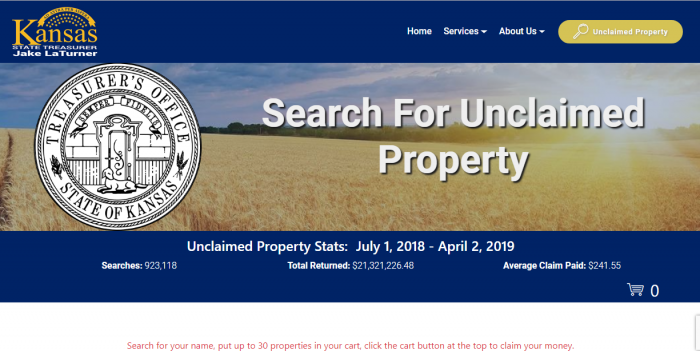
When people begin the unclaimed property process, they often find the idea of searching for and claiming property to be daunting. However, states have really streamlined this process and made it pretty easy to find and claim abandoned property. Additionally, even though many states use their own databases for these searches, searches are relatively similar regardless of which database you use. Therefore, once you have mastered searching for and claiming property in one state’s unclaimed property database, you will probably find it easy to search other state databases. If you still find it intimidating, you can always look at our tutorials for other states.
In Kansas, beginning your unclaimed property search starts by checking out the state’s unclaimed property database. We have created a step-by-step tutorial that you can follow to see how to search for property on that database. In fact, in this comprehensive guide to unclaimed property searches in Kansas, we tell you everything you need to know about searching for and claiming unclaimed property in Kansas. This includes website information and links for Kansas’s unclaimed property database, information on Kansas’s unclaimed property laws, and information about locator (finder) services.
Kansas’s unclaimed property page is located on the Kansas State Treasurer’s website
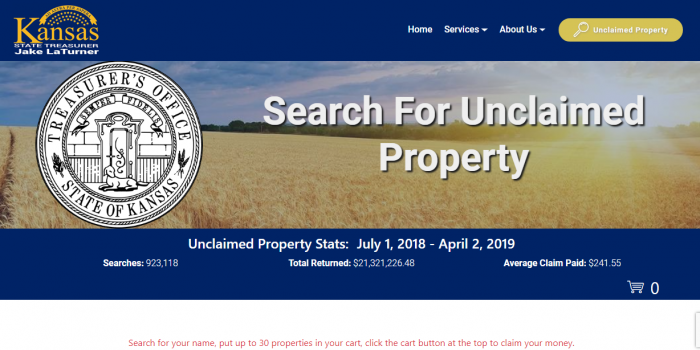
Kansas’s Unclaimed Property Database
In the days before Kansas established a statewide unclaimed property database, searching for unclaimed property in Kansas would have required looking in every county in the state. That would have meant searching all of the following counties: Allen, Anderson, Atchison, Barber, Barton, Bourbon, Brown, Butler, Chase, Chautauqua, Cherokee, Cheyenne, Clark, Clay, Coffey, Comanche, Cowley, Crawford, Decatur, Dickinson, Doniphan, Douglas, Edwards, Elk, Ellis, Ellsworth, Finney, Ford, Franklin, Geary, Gove, Graham, Grant, Gray, Greeley, Greenwood, Hamilton, Harper, Harvey, Haskell, Hodgeman, Jackson, Jefferson, Jewell, Johnson, Kearny, Kingman, Kiowa, Labette, Lane, Leavenworth, Lincoln, Linn, Logan, Lyon, Marion, Marshall, McPherson, Meade, Miami, Mitchell, Montgomery, Morris, Morton, Nemaha, Neosho, Ness, Norton, Osage, Osborne, Ottawa, Pawnee, Philips, Pottawatomie, Pratt, Rawlins, Reno, Republic, Rice, Riley, Rooks, Rush, Russell, Saline, Scott, Sedgwick, Seward, Shawnee, Sheridan, Sherman, Smith, Stafford, Stanton, Stevens, Sumner, Thomas, Trego, Wabaunsee, Wallace, Washington, Wichita, Wilson, Woodson, and Wyandotte. The process was greatly simplified, not only by the state developing a comprehensive statewide program but also by putting the information in a searchable database.
What is Unclaimed Property?
Unclaimed property has a number of different names. You may hear it referred to as unclaimed property, unclaimed property, abandoned property, and abandoned property. It all refers to property or property where the actual owner of the property has failed to maintain contact with the holder of the property for a period of time as set out in the relevant state statutes. While unclaimed property can refer to a wide variety of different property types, not all property falls under the state’s unclaimed property program. Like other states, Kansas does not include two very specific types of property in its unclaimed property program: real property and motor vehicles. Instead, negotiable instruments and cash form the basis of its unclaimed property program, though some tangible personal property, such as the contents of safe deposit boxes, gets included in the definition.
In Kansas, many types of property will be presumed abandoned after five years. However, Kansas also has some unusually long periods before specific types of property will be considered
How Much Unclaimed Property is in Kansas?
Kansas currently has over 350 million in unclaimed property that is waiting to be returned to its rightful owner. While that may seem like a large amount, it is relatively small when compared to the total amount of property that is available in the United States. According to the National Association of Unclaimed Property Administrators (NAUPA), an organization devoted to helping property owners locate and claim their lost or abandoned property, there is currently around $42 billion in unclaimed property in the U.S. Moreover, Kansas has returned almost one-fourth of all its available unclaimed property to actual owners in recent years, in part because the Kansas treasurer has made significant efforts to increase outreach and education about the state’s unclaimed property program.
Kansas Unclaimed Property Finder
You can find Kansas’s unclaimed property database here
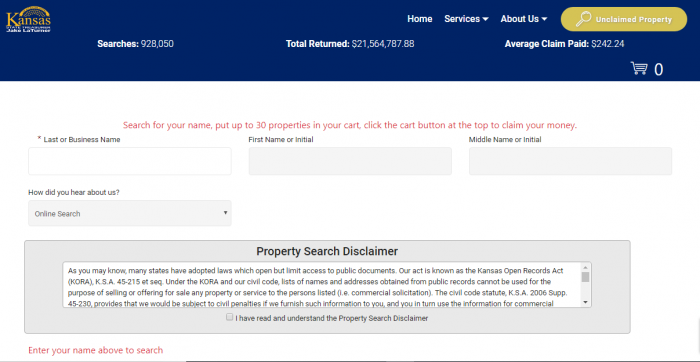
As you can see, you can begin your search with just a last name or business name. Kansas also gives you the option of adding first names/initials and middle names/initials.
In all our tutorials, we use the common name Bob Smith. We use the same name in each tutorial so that users can compare tutorials for different states. We also choose a common name because there are some potential pitfalls when searching for commonly occurring names, and we want to highlight those in our tutorials.
Searching by last-name only, we get the following results:
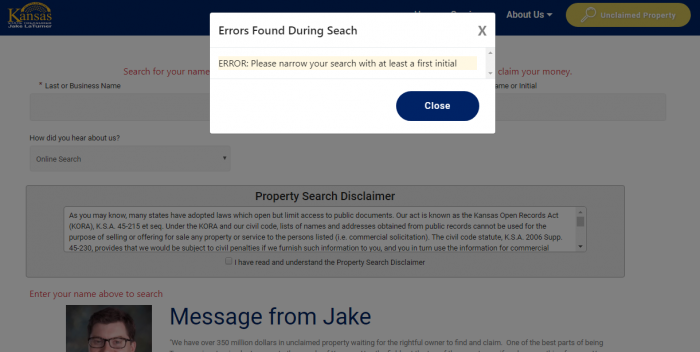
In other words, there were so many potential search results that Kansas could not even return results for a searching using only the surname Smith.
Searching for Bob Smith resulted in a manageable 49 possible results:
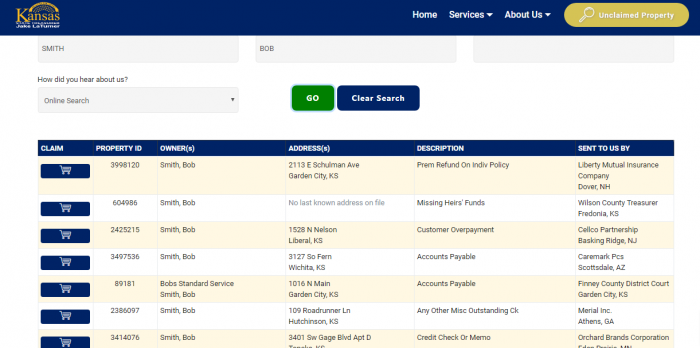
Looking at the results, you see that the following information is available for each potential claim: the property id number, the owner’s name, the owner’s last known address on file, a description of the type of property, and who sent the property to the state of Kansas. There is also a way to claim each property, a shopping cart icon that is in the left hand “claim” column of each claim.
When you hit the shopping cart icon, the claim is then sent to your shopping cart, which is at the top right of the screen. You can see that you have claims by looking at the number next to that cart. In this instance, we have claimed two properties:
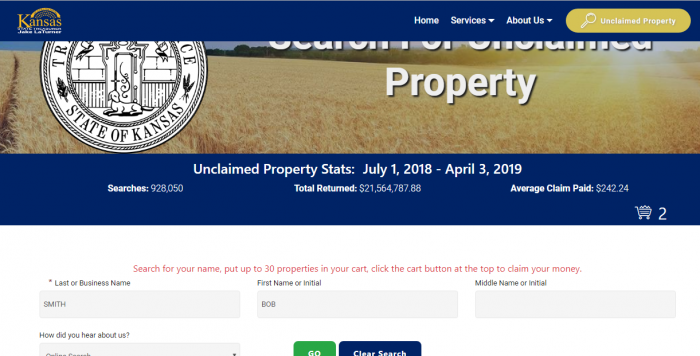
When you have finished selecting properties and are ready to begin the claim process, you just hit the shopping cart. Hitting the shopping cart takes you to a page like this:
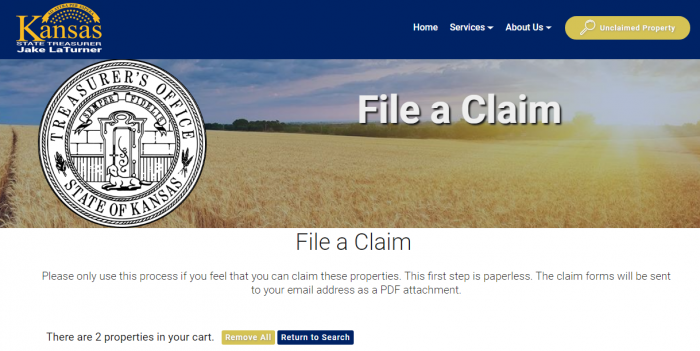
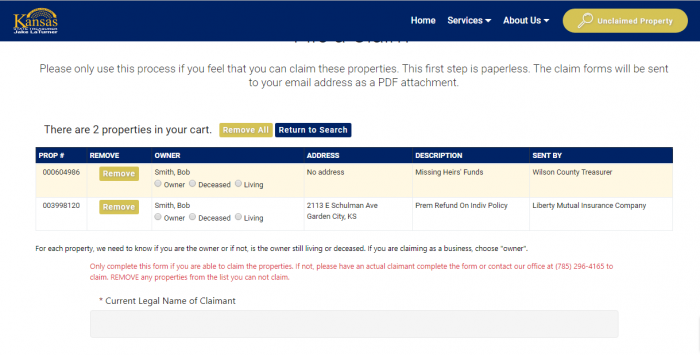
As you can see, for each property that you want to claim, you will be asked whether you are the owner and whether the owner is deceased or living. You must select this for each property you are claiming.
Next, you are asked to fill out a claim form, which is found on the same page:
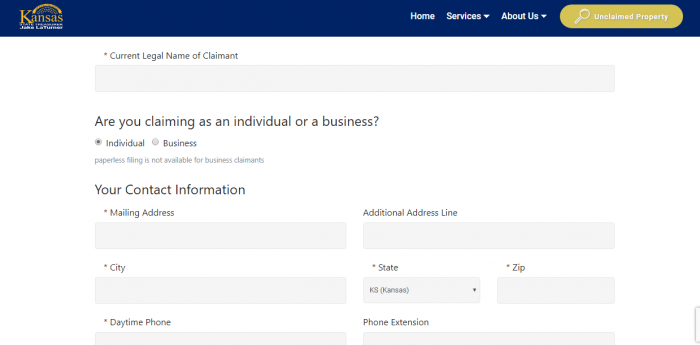
On the claim form, you will be asked to provide a variety of different information, including the claimant’s current legal name, whether you are claiming as an individual or business, mailing address, city, state, zip code, daytime phone number, and an email address.
Once you fill out the claim form, the state will send you additional claim forms, including information about documentation that you must provide, via a .pdf attachment to the email address you provide. If you have questions about this process, you can contact the state of Kansas at 785-296-4165.
Unclaimed Property Laws in Kansas
The Kansas Disposition of Unclaimed Property Act is located in 2011 Kansas Code Chapter 58, Article 39.
Kansas Unclaimed Property FAQ
How long does Kansas hold unclaimed property?
Kansas holds abandoned property for an indefinite period of time. After three years, the state may elect to sell certain abandoned property, such as securities, and convert it to property property and hold that property for the actual owner. The state may also sell or destroy tangible property that it determines lacks actual value.
Examples of Unclaimed Property
Abandoned property or unclaimed property in Kansas is similar to unclaimed property you will find around the United States. It includes most types of negotiable property including things like the contents of savings and checking accounts, cash, bonds, stocks, royalties, refunds, the contents of safe deposit boxes, court deposits, insurance benefits, oil and gas royalties, cash dividends, wages, and utility deposits.
Does the state of KS make efforts to locate owners?
Kansas did not have a very strong reputation for making efforts to locate actual owners until the most recent State Treasurer was elected, but he has made significant efforts to reunite actual owners with their property. He has enacted a variety of different initiatives to help people in Kansas locate their lost resources.
Other sources to search besides KS state database?
If you live in or recently lived in Kansas, then it makes sense to start your unclaimed property search in the KS unclaimed property database. However, it is important to understand that a single-state unclaimed property search is rarely going to be sufficient to help people locate all of their unclaimed property. Even if you have only lived in a single state, you may have missing property that will never be reported to your state. First, federally held resources, such as unclaimed savings bonds or uncashed IRS tax returns, will never escheat to the state. Second, you may have resources in other states, even if you never lived there. That is why we suggest you make a thorough list of all of the places you should search before beginning your unclaimed property search.
You will almost certainly need to include some other states on your list. You want to put any states where you have lived, but do not forget to include states where other people have lived as well. Which other people? Do you have relatives who may have placed property in your name? What about relatives for whom you would be an heir? If so, you need to search the states where they lived. You also want to think about states where you may have established business contacts, but that might not have had your last known address.
Once you have made your list of states, you also want to think about the national-level sites to include in your search. Almost every person in the United States has their property pass through the hands of the federal government at some point in time. That is why we suggest that most people search the following four federal-level sites: the Internal Revenue Service (IRS), the Pension Benefit Guaranty Corporation, the U.S. Treasury, and the Life Insurance Policy Locator.
The odds are high that you have been owed property by the IRS at some point in your life. Therefore, it should come as no surprise that the IRS is a significant source of unclaimed property. Not only does it process property from most Americans, but it also has a policy of refusing to forward IRS refund checks when the owner’s address has changed since filing the tax return. To get your refund, you must notify the IRS if you change your address. They explain their policy in detail on their website:
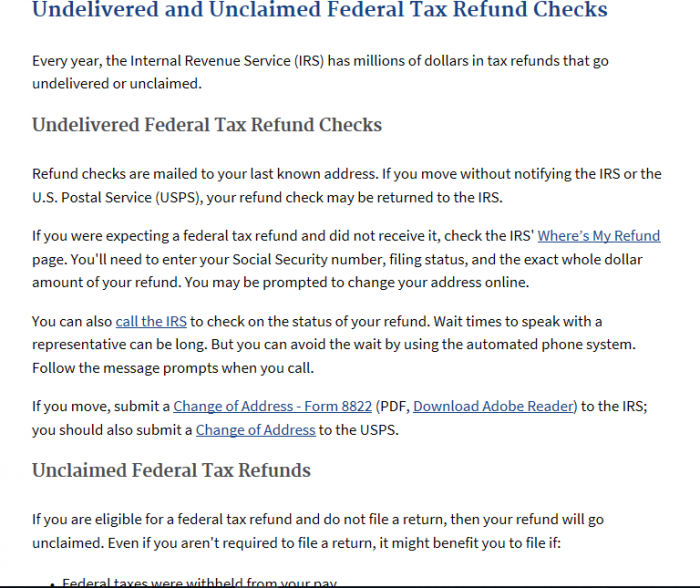
As you can imagine, with millions of taxpayer refunds processed each year, this can result in a number of missing tax refund checks. In fact, the problem is so common that the IRS even has a dedicated Where’s My Refund? page.
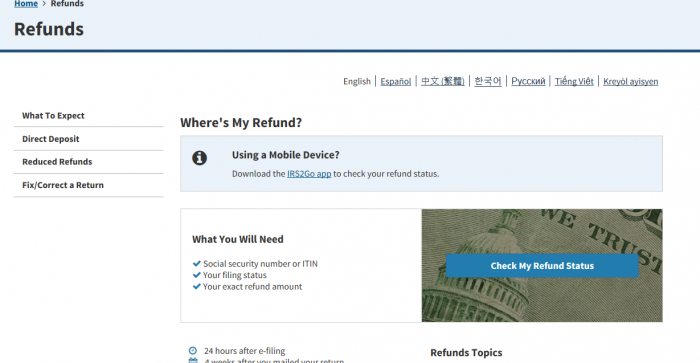
You also want to be sure and check with the U.S. Treasury. It is very common to purchase savings bonds as presents for children, whether at birth or to recognize a life event. These savings bonds may get lost. Once upon a time, the Treasury ran a user-friendly database that could help people locate their lost/abandoned savings bonds. For some reason, they discontinued that service, which has made finding lost savings bonds much more difficult. You can still visit their site for more information on locating lost savings bonds. You can also call them at 844-284-2676 for more information. The website to visit is Treasury Direct
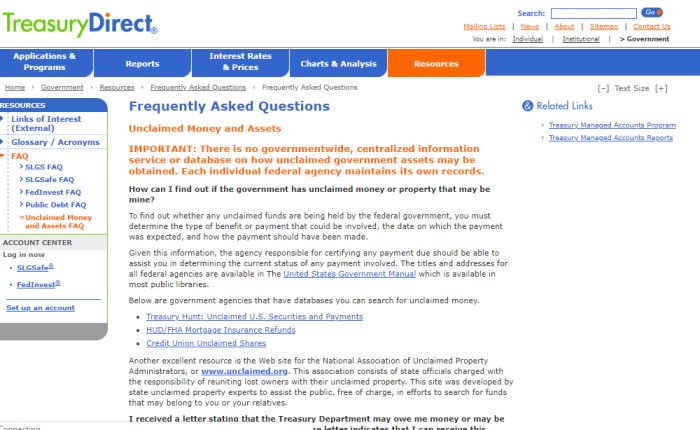
A little known federal corporation is Pension Benefit Guaranty Corporation (PBGC). As its name suggests, the purpose of the PBGC is to guarantee pension benefits. It is a federal organization, but its role is to protect private pension funds and to help ensure that the beneficiaries of pensions actually get their property. They run an unclaimed plans search database, which you can find at their website:
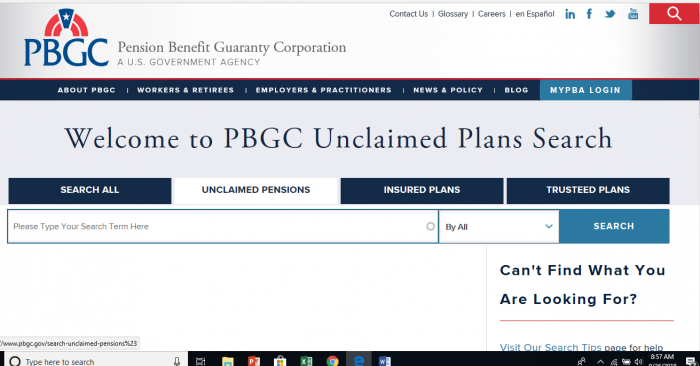
We are including the National Association of Insurance Commissioners’ Life Insurance Policy Locator Service in our list of federal-level resources, though it is actually a purely private organization. It is a conglomeration of life insurance agencies, which allows you to provide them with information that it can send out to its member agencies for them to check their files to see if you are the beneficiary of any of their unpaid life insurance policies.
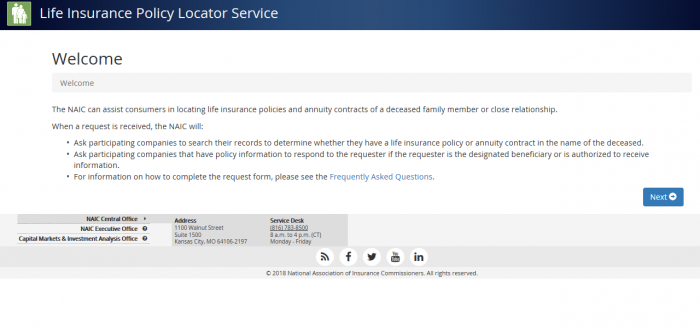
In addition, there are some national-level sites that may be critical for some people, but inapplicable for others. Consider including them in your unclaimed property search, if you believe that they might apply to you: the FDIC https://closedbanks.fdic.gov/funds/, the Department of Housing and Urban Development http://entp.hud.gov/dsrs/refunds, the National Credit Union Administration www.ncua.gov/services/Pages/asset-management/unclaimed-deposits.aspx, and the Veteran’s Administration Benefits Department www.insurance.va.gov/liability/ufsearch.htm.
What is the best way prevent my property from becoming lost or unclaimed?
One of the most frequent questions we get from people is how to prevent their property from becoming lost or unclaimed. We cannot stress the ease and convenience of electronic account management enough, and we strongly suggest you choose that option when it is available, both when opening new accounts and for your old accounts. Other tips for keeping track of your property include: making detailed account records, informing all institutions when you have a name or address change, interacting with your account holders at least once a year, and responding to all attempts at communication from your financial institutions.
How do I make sure my heirs know where my assets are if I die?
Designate a trusted individual to get access to all of your account information in the event that you die or become incapacitated. You need to leave this person a detailed list of all of your accounts and assets, as well as access information like user names and passwords.
Should I hire a finder to conduct the search?
In Kansas, as with other states, it is free to search for and claim your unclaimed property. This means that hiring a finder service, which generally takes a percentage of any property they find, is unnecessary. However, if you would not complete a search on your own, you may find that hiring a finder service is actually helpful in reuniting you with your lost property.
Why does Kansas take possession of unclaimed property?
In the days before unclaimed property programs, holders could make it difficult for people searching for their lost property to locate and claim the property. There was an incentive for this, because all of the unclaimed funds could be used to generate profits for the holders. Therefore, unclaimed property programs, like the one found in Kansas, can be seen as consumer protection programs.
Conclusion
You do not have to be a pirate to search for treasure! Instead, you can simply begin an unclaimed property search and find your own missing loot.